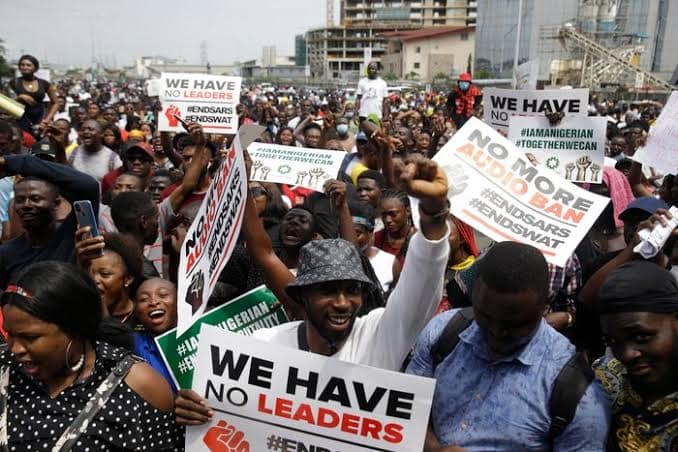Nigeria crypto protests are growing in intensity as the cryptocurrency community joins forces with the broader #EndBadGovernanceInNigeria movement. These protests, which focus on addressing various governance issues, also highlight the crypto industry’s demand for regulatory reforms. This collaboration is seen as a pivotal moment for pushing for changes that could benefit both the industry and the national economy.
The Demand for Regulatory Reforms
Nigeria crypto protests have underscored the need for dialogue and cooperation between the government and the crypto community. By working together, stakeholders can ensure that new policies will foster growth and benefit the entire nation.

One of the critical aspects of these protests is the push for clear and favorable regulations that can support the growth of the cryptocurrency sector. The current regulatory environment in Nigeria has been described by many as uncertain and restrictive, which has stifled innovation and growth in the industry. The crypto community is calling for a more defined regulatory framework that would provide clarity and confidence for investors and entrepreneurs alike.
Nigeria Crypto Protests: Crypto Industry Representation
Rume Ophi, former Secretary of the Stakeholders in Blockchain Technology Association of Nigeria (SiBAN), is a leading advocate for incorporating crypto-related demands into the broader protest agenda. Ophi emphasizes the right of citizens to demand changes that benefit the nation, stating, “First and foremost, it is the right of citizens to make demands that favor the nation. In this case, it is a peaceful protest. Since some of these demands have been made by the protest organizers, one would expect a crypto demand to be there.”

Ophi argues that favorable crypto regulations could attract significant investment, create jobs, and spur economic growth. He suggests that including a demand for crypto-friendly regulations could be a strategic move. “Like friendly crypto regulations so investors can jump on the industry to employ people. I don’t support the destruction of state property, but a demand to draft a friendly regulation by the National Assembly should be part of the demands,” Ophi added.
The inclusion of crypto-related demands in the protests is seen as a way to bring more attention to the potential benefits of the cryptocurrency industry. By advocating for better regulations, the crypto community hopes to unlock the sector’s full potential and contribute to the broader economic growth of Nigeria.
Nigeria Crypto Protests: Diverging Opinions on the Need for Crypto-Specific Protests
Despite the growing support, not everyone in the Nigeria crypto protests agrees with this approach. Chimezie Chuta, Chairman of the National Blockchain Policy Steering Committee, offers a different perspective. He notes that the government has already made significant strides in supporting the blockchain and crypto industry.
Chuta highlights the establishment of a steering committee to ensure the successful implementation of the National Blockchain Policy, which addresses many of the industry’s needs. He sees no necessity for additional protests focused solely on crypto regulations. “The government has set up a National Blockchain Policy Steering Committee, which I chair, to address these issues. We are working diligently to ensure that the policies put in place will benefit the industry and the nation as a whole,” Chuta stated.
Chuta’s stance is that the current efforts by the government should be given time to bear fruit before additional demands are made. He believes that the existing policies already address many of the concerns raised by the crypto community and that the focus should be on implementing these policies effectively.
As Nigeria crypto protests continue to gain momentum, they reveal the importance of dialogue and collaboration between the government and the crypto community. By engaging in constructive discussions, both parties can work towards policies that support the industry and contribute to national economic growth.

The ongoing protests also serve as a reminder of the significant potential that the cryptocurrency industry holds for Nigeria. With a young and tech-savvy population, Nigeria is well-positioned to become a leader in the global crypto market. However, this potential can only be realized with the right regulatory framework and support from the government.
The path forward for Nigeria crypto protests involves continued advocacy and engagement from the cryptocurrency community. By maintaining a peaceful and constructive approach, the community can work with the government to create a regulatory environment that fosters innovation and growth.
There is also a need for more education and awareness about the benefits of cryptocurrencies and blockchain technology. By increasing understanding among policymakers and the general public, the crypto community can build broader support for their cause.
In conclusion, the Nigeria crypto protests illustrate the determination of the country’s cryptocurrency community to have their voices heard and their needs addressed. With advocates like Rume Ophi pushing for favorable regulations and leaders like Chimezie Chuta acknowledging the government’s efforts, the path forward will require careful negotiation and collaboration.
Stay updated with The BIT Journal for the latest news on Nigeria crypto protests and other significant developments. As your trusted source for breaking news and in-depth coverage, we are committed to keeping you informed on the latest happenings.





























